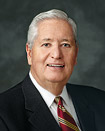The Sanctifying Work of Welfare, by H. David Burton
Presiding Bishop

We go outside in the fall and find the weather more chilly than we expected and proclaim of the 50° temperature, "It's freezing!" Similarly, after a few hours of not eating, we may find ourselves announcing to a friend, "I'm starving!"
It's not freezing (50° is above 32°—I'm talking Fahrenheit, of course), and you're not starving, but we use these words anyway.

I often laugh inside when my children will dramatically crawl toward me, the very picture of well-fed misery, and act thoroughly languished because they didn't eat enough dinner an hour earlier. Of course, they'll say they're starving, but we all know they're not.
But I wouldn't laugh if my children—or others' children—really were in need.
In his address, Bishop Burton reminded of the importance the Church puts on the temporal welfare of all people with quotes from Heber J. Grand and President Hinckley:
President Grant wanted "a system that would . . . reach out and take care of the people no matter what the cost." He said he would even go so far as to "close the seminaries, shut down missionary work for a period of time, or even close the temples, but they would not let the people go hungry."
Responding with hurricane relief in Nicaragua, President Hinckley said:
As long as the Church has resources, we will not let you go hungry or without clothing or without shelter. We shall do all that we can to assist in the way that the Lord has designated that it should be done.
Much like I don't simply give my children a treat when they didn't eat their dinner and are feeling hungry later, or even just give them more food, I'll remind them of the need to eat dinner in hopes that they'll learn to take care of themselves—and then I may give them something to eat.
Are the principles of providing temporal welfare and teaching self reliance at odds with each other? Should we succor others or should we teach them to take care of themselves?
The answer is obvious: BOTH!
Bishop Burton testified:
No matter how many temples we build, no matter how large our membership grows, no matter how positively we are perceived in the eyes of the world—should we fail in this great core commandment to "succor the weak, lift up the hands which hang down, and strengthen the feeble knees," or turn our hearts from those who suffer and mourn, we are under condemnation and cannot please the Lord9 and the jubilant hope of our hearts will ever be distant.
. . .This is the sacred work the Savior expects from His disciples.
In the future, when I hear others say "it's freezing" when it's not, or "I'm starving" when they're not—or even when it is, and they are—I hope I won't laugh inside, but will rather remember that there are things I can do to help.
------------------------------------
As an added bonus, here is a video we put together after we had an opportunity to help send some much-needed supplies for distribution by friends living in Angola:



0 thoughts
Post a Comment